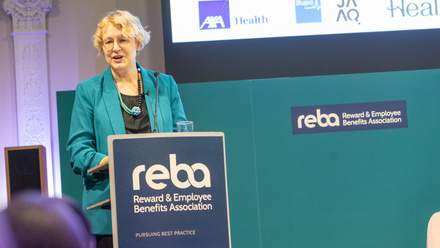Three ways that technology is reshaping and future-proofing benefits strategies

Working from home deepened our reliance on technology in the day-to-day running of businesses, with Zoom, Slack, and productivity tools like Trello and Monday becoming commonplace. The digitalisation that happened in communication and performance also spilt over into the delivery of employee benefits; the onus still fell on employers to provide support for their teams’ wellbeing while the office remained closed.
Technology doesn’t need to act as a temporary measure to cover existing gaps in your wellbeing programme. The opportunity is there for employers to future-proof their offering in order to attract and retain the best workforce using digital tools and technology. Here’s how:
1. Providing access to the best protection and care
Demand for telemedicine has exploded over the past year. The digital unit of the UK’s health service, NHSX, reported that more than 75% of all UK GP practices used video to see patients in the third week of April 2020, compared to under 10% prior to the pandemic. With the anxieties of meeting in-person continuing well into 2021, and the convenience of being able to get seen and treated virtually for the majority of issues, adding virtual GP support into your employee wellbeing programme will make it a well-utilised benefit.
The same goes for mental health – with access to counselling being slashed, many Britons are being given medication instead, with a Guardian investigation finding that more than six million people received antidepressants over a three-month period last year. With NHS resources for mental health being stretched, it’s important to be able to give employees access to the right support.
A recent YouGov survey, created in partnership with YuLife, found that more than 20% of respondents find life insurance to be a more important benefit now than they did before the pandemic. While wellbeing is at the forefront of people’s thoughts, employers should consider offering this benefit to employees to give them and their loved ones peace of mind with a group life insurance policy that will protect should the worst happen.
2. Personalising benefits and support
Office-based benefits as fruit baskets, subsidised drinks on a Friday, or corporate gym memberships may have been popular in the short-term, but little data existed to show the positive impact it had on employee wellbeing. One of the main benefits of digitisation and the collection of data can mean that employers will be able to make informed decisions as to what benefits to provide their team in the future.
With the anonymised data that can be collected through workplace wellbeing apps, employers can gain insight into team activity, including steps and mindfulness minutes. Apps can also be used to direct employees to the right resources to best support them – for example, if mindfulness challenges are mostly taken late at night, signposting mental health counselling for stress and sleep could ensure a happier, healthier team in the long term.
3. Bringing the gym home
Apps such as Strava and Map my Run shot up in popularity over recent months, as people wanted to keep up their physical fitness through lockdowns. Instead of providing a corporate gym membership that will go unused and see no return on investment, go digital and provide access to at-home workouts or through apps that cater to all physical levels and interests.
Wearable fitness technology is a fantastic way to track not just your activity, but sleeping and eating habits. Business insider research found that employers that offer five or more health best practices to their staff reported having 11% less average turnover than those who offer two or fewer – providing wearables would be a great step in adding to your team’s best health practices.
This article is provided by YuLife.
In partnership with YuLife
YuLife is the first digital life insurance provider on a mission to inspire life.







